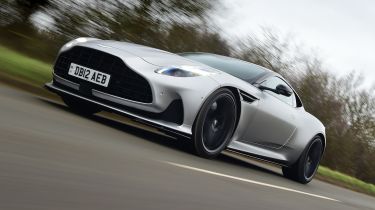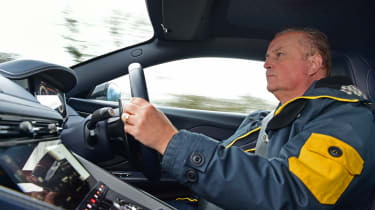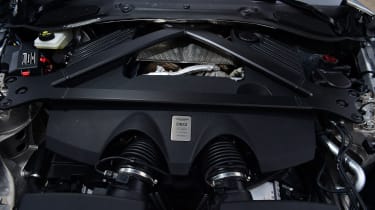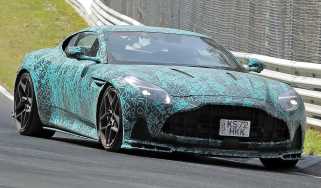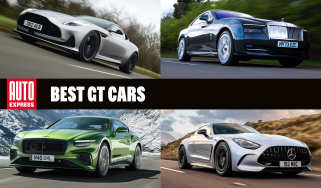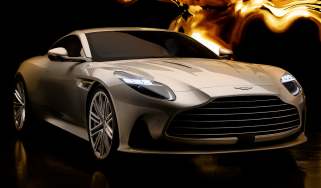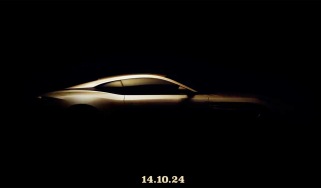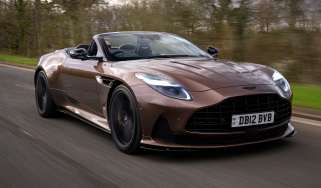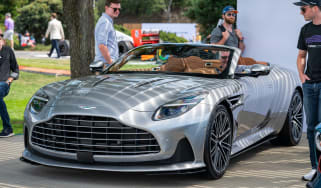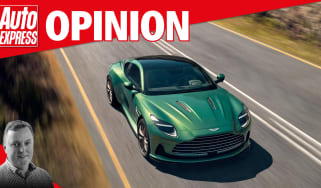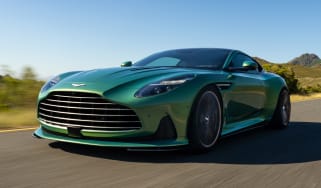New Aston Martin DB12 review: almost as good to drive as to look at
The best Aston we’ve ever driven, but it could dial up the comfort

Verdict
The DB12 is a great advert for Aston Martin under its latest ownership and management team, but it’s not quite perfect. It’s a seriously impressive driver’s car, with a huge range of abilities that belie the car’s size and layout – as a ‘Super GT’ it ticks the ‘Super’ box good and proper. But with hotter DB12s likely to follow – an AMR version is surely on the cards – we’d rather it be a bit more ‘GT’ and a little less ‘Super’. As is, we found the tyre noise especially tiring, and we’d rather a slightly more supple ride too. Some of the tech still feels a generation behind, as well. But then, for £185k, you will have what is officially the most beautiful car in the world.
Back in November, we were standing on stage in Berlin handing over an award for the most beautiful car in the world to Aston Martin. German readers of our sister title Auto Bild, as well as the country’s biggest Sunday paper Bild Am Sonntag, had voted for the DB12 in the prestigious Golden Steering Wheel Awards.
Now we can confirm that on a cold, wet, winter’s morning, the latest in an illustrious line of Aston Martin DB models does, indeed, brighten up the dullest of days. It is, as my German friends pointed out, quite beautiful.
Used - available now

2025 Toyota
Yaris Hybrid
37,962 milesAutomaticPetrol1.5L
Cash £14,300
2022 MG
HS
41,109 milesAutomaticPetrol1.5L
Cash £15,663
2023 Tesla
Model 3
26,881 milesAutomaticElectric
Cash £21,000
2019 Ford
Kuga
69,946 milesAutomaticDiesel2.0L
Cash £11,763That has often been the case with Astons in the past, but dynamically they’ve sometimes failed to deliver. Not so here – the DB12 is the best Aston Martin we have ever driven. Yet the question is, does it need to be?
Aston calls its latest model a Super GT, and the numbers back that up. Under that long, shapely bonnet is a Mercedes-AMG-sourced, Aston Martin-tuned, twin-turbo V8 producing 671bhp and 800Nm. What that means in the real world is that if you’re heavy with the throttle in a straight line above 30mph, the huge Michelins on the rear wheels will still spin on a damp road – as we found out. A quick steering adjustment and some deep breathing soon gets the car and your heart rate back where it needs to be.
This car, though, is all about raising your heart rate – and its abilities are truly astonishing. This is one very quick car from point-to-point, and not just thanks to its 3.6-second 0-62mph time.
Not only is that engine mighty, with a seemingly endless stream of power, there’s also a beefy exhaust note to accompany the acceleration, with a slightly rowdy blip at start-up to let you know what it’s all about. The eight-speed ZF gearbox is sublime, snapping through shifts smoothly, while the steering is just delicious – not so sharp that you’re constantly fiddling, but with a perfect weight to give you confidence through corners. It’s quick enough to let you flick from left to right and flow through consecutive tight bends, too.
Despite the DB12’s size – and you’ll feel the width as you thread through narrow country lanes or down tight city streets – it has the impressive ability to feel smaller and more agile than you’d expect. It sits head and shoulders above the DB11, which is some feat as that’s the car the DB12 is based on.
The brakes are similarly impressive at helping the car shed speed, although the modulation through the pedal can feel a little odd at lower speeds – we’d like it to be a little more linear. Similarly, the ride could be a little bit more supple. It can get a bit tiresome over longer stretches of poorly surfaced roads – of which we have many in the UK.
And as much as there are huge amounts of grip (if you respect the instant power available) those big tyres do kick up quite a racket. So much so that you’ll be talking to your passenger with a slightly raised voice at a cruise.
It’s likely to be passenger in the singular, too. We did manage to get into the back seats, but as our photographer, with his head pressed against the roof, said, “it’s cosy, very cosy.”
That roof, though, is a fine example of the strides Aston Martin has made in the quality department. It features beautifully quilted leather on it, and the rest of the cabin materials are top-notch, too; classy and contemporary.
The balance between the touchscreen and the various knobs and switches errs on the side of old school, however, which for most people is a good thing. The push button gear selector has been replaced by a small leather-wrapped lever, which is surrounded by dials for the air-con, and buttons for everything from suspension control to exhaust noise. The switches on the steering wheel are a little less easy to use, though, especially now it’s fitted with the touch sensitive pads that other brands are quickly moving away from. Frustratingly, these can change your driving display with an errant brush of the finger.
There’s still a proud Aston Martin-branded central start/stop button, but that has a dual function with its rotating surround used to select GT, Sport, Sport+ or Individual driving modes. We preferred the latter with everything in the more comfortable settings, but with the exhaust dialled up for a bit of aural enjoyment.
Although the bespoke touchscreen is a huge improvement over the old Mercedes hand-me-down systems, it still does feel a generation behind some of the set-ups you’ll find in rivals – not least because you have to resort to a good old-fashioned wire to connect Apple CarPlay. Even some superminis offer a wireless hook-up these days.
And while our car was a very early example, there was a slight buzz coming from the back of the cabin, and we had an intermittent fault with the forward-facing camera system, throwing up errors on the emergency braking and traffic sign warning systems. We’d want customer cars to be perfect – especially with a starting price of £185,000.
| Model: | Aston Martin DB12 |
| Price: | £185,000 |
| Powertrain: | 4.0-litre twin-turbo V8 |
| Power/torque: | 671bhp/800Nm |
| Transmission: | eight-speed automatic, rear-wheel drive |
| 0-62mph: | 3.6 seconds |
| Top speed: | 202mph |
| Economy: | 23.2mpg |
| CO2: | 276g/km |
| On sale: | Now |

